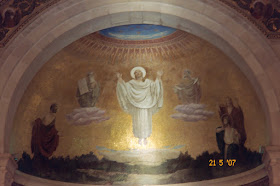Passion Sunday
In the name of the Father, and of the Son, and of the Holy Spirit. Amen. When it comes to the Bible, I think sometimes we have this sense that the New Testament is all we need to read. And certainly, it is often a bit easier. The Gospels and the Acts of the Apostles are pretty straight forward. The writings of St. Paul, while including some long sentences with very complex structure, are instructive, as are the other epistles from St. Peter, St. Jude, and St. John. Yeah, Revelation or the Apocalypse of St. John can be a bit confusing and/or scary, and easily misunderstood and misinterpreted, but generally, the New Testament seems like the place to focus. To use an analogy, the New Testament seems like nice, sunny pastures with rolling hills, while the Old Testament, even with some of the familiar stories that we enjoy, seems much more like a forest with thick growth, and a narrow trail through it.
But we cannot truly understand Christ without understanding what He Himself revealed before the Incarnation. We cannot be like the gnostic heretics who claimed that the God of the Old Testament was a different God than Jesus Christ. When read properly, the Old Testament points to and is fulfilled in Christ. That is one of the points of the Gospel today. Our Lord says, “‘Abraham rejoiced to see my day.’” Abraham rejoiced because in Christ, God’s covenant would be opened up to all nations, a covenant made with a true son of Abraham through Isaac, Jacob, and Joseph.
The evangelists and apostles were great at seeing how Christ was revealed throughout the Old Testament. The Letter to the Hebrews, our epistle today, in another place talks about Melchizedek as a type of Christ, since he was king of Jerusalem and a priest of God Most High, and because he had no lineage given (unlike almost everyone else in Genesis), and because He blessed Abram, noting that only a greater blesses a lesser. The author of the Letter to the Hebrews also quotes Psalm 2 when he asks, “to which of the angels did God ever say: ‘You are my son; this day I have begotten you’?” And he also quotes other verses to shows Christ’s superiority to the angels. St. John the Apostle and Evangelist loves to quote earlier Scriptures as he saw them fulfilled by the Savior. When the soldiers cast lots for the robe at the crucifixion, he quotes Psalm 21:18; when the soldier pierces the dead body of Christ with a lance rather than breaking the legs, he quotes Psalm 33:21 and Zechariah 12:10.
The Church Fathers also saw Christ prefigured in Old Testament figures who had their proper importance in their own right. Christ is the New Adam, the new head of humanity, who, rather than disobeying God and dooming all of humanity, is obedient to God, even to the point of death, and so graces all humanity and opens for all the children of Adam and Eve the possibility of eternal life in heaven.
Christ is prefigured in Abraham. Abraham left his home at the direction of God, and was promised descendants numerous as the stars in the heaven. Christ “journeys” to earth to fulfill the will of the Father, and joins both Jew and Gentile to God, so that the number of the elect comes from every corner of the earth.
Christ is prefigured in Jeremiah the Prophet. Jeremiah preached tough messages to the people of Judah. He condemned trusting in a building, even the Temple of the Lord, and called the people to be faithful to God. For preaching God’s message, Jeremiah was opposed and oppressed by the king and leaders of Judah, even though his words came true. Christ preached the Word of God, and foretold the destruction of the new temple built by Herod, built after the temple that Jeremiah saw had been destroyed by the Babylonians. He was opposed and oppressed by the leaders and many of the chief priests, Pharisees, and scribes of His own day. Christ called all to fidelity to God and a return to Him.
This could go on and on (maybe you feel like it has already!). But the point is that the entire Old Testament points to Christ and is fulfilled in Him. Beyond the people, all the sacrifices of the Old Testament are fulfilled and perfected in the one, perfect sacrifice of Christ on the Cross, which we will celebrate in a particular way on Good Friday. So if we wish to truly appreciate who Christ is and what He did for us, we need to be well-versed in the what came before Him. Yes, it can sometimes seem strange, and needs to be unpacked, and should be done with the assistance of the Magisterium, the official teaching office of the Church. But rather than avoiding it because it can be confusing, let’s take the safe path of how the Church has read the Old Testament, so that we can arrive at the one fountain of life that forms the hinge between the Old and the New Testaments, Jesus Christ, who with the Father and the Holy Spirit, lives and reigns for ever and ever. Amen.






